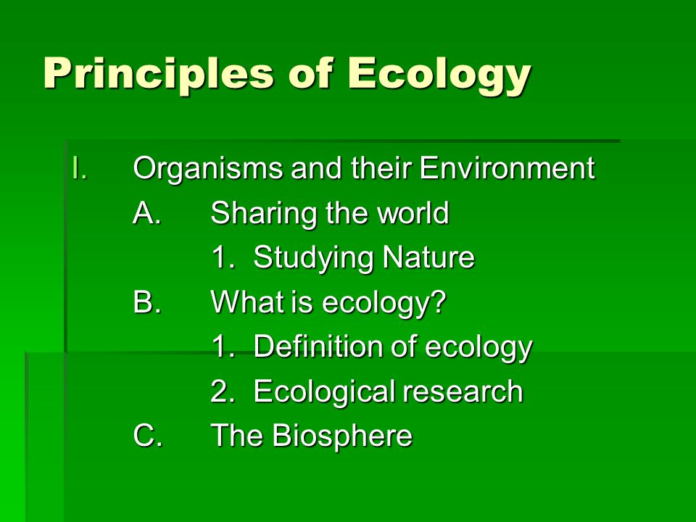The time period atmosphere was first authored by the Swedish scientist Anton von Keyserling in 1855. He outlined it as “the examine of the rules of ecology of organism to their atmosphere.” In different phrases, ecology research how organisms work together with one another and their pure atmosphere. Though the sphere of ecology has advanced considerably through the years, there are nonetheless some core rules that stay true throughout all disciplines. This text will discover seven rules and the way they might help you perceive and enhance your relationship with nature.
Ecosystems
Nature is the investigation of the communications between residing organisms and their atmosphere. It encompasses varied subjects, together with plant ecology, animal ecology, aquatic ecology, and terrestrial ecology.
The rules of ecology are:
1. Vitality circulate: The whole lot in an ecosystem will get vitality from elsewhere. This vitality comes from the solar, vitamins within the soil, water vapor within the air, wind, or the motion of animals or crops. It could possibly additionally come from loss of life and decomposition processes.
2. Regulation: Ecosystems must be regulated to take care of a steadiness. Because of this totally different components of an ecosystem have totally different wants and should work collectively to maintain the whole lot working easily.
3. Interdependence: All components of an ecosystem are linked. The well being of 1 half impacts the well being of one other reduce, and vice versa.
4. Ecosystem operate: How an ecosystem operate is important for the survival of the organisms in it. This may embody issues like offering meals, shelter, and vitality; regulating the atmosphere; and producing items and companies that people use.
5. Ecosystem construction: How an ecosystem is structured impacts how nicely it features. For instance, an ecosystem with lots of range (e.g., plenty of several types of timber) will likely be higher at regulating the atmosphere than an ecosystem with just some sorts of timber.
Components of an Ecosystem
All scientists should comply with 4 elementary rules of ecology when finding out ecosystems: 1) Stability: All programs in an ecosystem should keep a fragile steadiness, or they are going to finally endure. 2) Meals chain: The meals chain exhibits how vitamins and vitality circulate by means of an ecosystem. 3) Predator/prey relationships: Animals that hunt different animals for meals reside in predator/prey relationships. 4) Homeostasis: Ecosystems must maintain a continuing steadiness, or they won’t survive.
Ecosystems are composed of assorted parts that each one work collectively to maintain the whole lot functioning easily. These parts embody crops, animals, soil, water, and air. Every of those parts has a selected function in shaping the ecosystem.
Crops present the ecosystem with their main supply of vitamins. In addition they assist to control the atmosphere by absorbing and releasing water, creating shade, and moderating temperatures. Animals are important to an ecosystem as a result of they play a big function in feeding different organisms and destroying undesirable vegetation.
Predators (reminiscent of lions) hunt prey (reminiscent of antelopes) and assist to maintain populations in examine. Soil is important as a result of it offers houses for crops and animals and storage for vitamins and water. Water is important for all organisms in an ecosystem, nevertheless it additionally helps to cleanse the soil and regulate temperature. Air is important for respiratory, transporting vitamins, and controlling moisture ranges.
Vitality circulate in an Ecosystem
Biology is the investigation of the communications amongst natural entities and their present circumstance. The rules of ecology are based on the truth that each organism has a job in shaping its environment, whether or not including to or subtracting from the general ecosystem. There are 5 elementary rules of ecology: 1) range is important for ecological stability; 2) operate determines the type of an ecosystem; 3) linkages amongst species and between populations are important for sustaining ecological steadiness; 4) pure choice favors these populations greatest suited to their atmosphere; and 5) ecosystems are dynamic entities that continuously work together with their environment.
The trophic degree in an Ecosystem
Ecology is the examine of how totally different ranges of an ecosystem work together with one another. At its most simple, ecology investigates how organisms and their atmosphere work together to create ecosystems—the group at which an ecosystem operate impacts the way it impacts surrounding ranges. Relying on the story, an ecosystem could be categorized as main, secondary, or tertiary.
Major ecosystems are positioned close to the floor of the Earth, the place gases and water vapor are exchanged quickly. These programs are comparatively easy and comprise few species. rules of ecology ecosystems are house to invertebrates reminiscent of worms and mites, together with crops reminiscent of mosses and ferns. In temperate areas, these programs can also embody amphibians and small mammals.
Secondary ecosystems occupy higher depths beneath the Earth’s floor the place gasoline change is much less fast. This method is extra complicated than a main ecosystem because it incorporates extra species of crops and animals. Secondary programs happen in moist environments close to rivers or moist forests. Aquatic organisms reminiscent of fish reside in secondary procedures, whereas terrestrial creatures reminiscent of spiders make their houses in timber or below rocks.
Tertiary ecosystems occupy even higher depths beneath the Earth’s floor the place no mild or air reaches the bottom. These programs are house to a few of Earth’s most complicated life kinds, together with bugs, spiders, jellyfish, and coral reefs. Tertiary programs happen close to sizzling springs or synthetic caves in important cities like Tokyo or London.
You Can Additionally See alegrianatural.co
The biotic degree in an Ecosystem
Nature is the investigation of associations amongst residing beings and their present circumstance. There are three main rules of ecology: 1) inhabitants dynamics, 2) meals internet dynamics, and three) neighborhood construction. Inhabitants dynamics examines how populations develop and alter over time. Meals internet dynamics focuses on how totally different species work together with each other to create a meals chain. Neighborhood construction appears at how different species coexist in an ecosystem.
The abiotic degree in an Ecosystem
Ecology research how organisms work together with one another and their atmosphere. The rules of ecology are:
-The homeostasis precept: The steadiness between the interior atmosphere (reminiscent of temperature) and the exterior atmosphere (reminiscent of daylight) should be maintained in an organism or ecosystem.
-The meals internet precept: The trophic degree of an organism or ecosystem is set by its place within the meals internet.
-The succession precept: Ecosystems endure a sequence of levels over time, from easy to extra complicated.
Conclusion
1. The rules of ecology: Each organism is a member of an ecosystem, and each ecosystem has a elementary function in sustaining biodiversity, environmental stability, and the biking of vitamins.
2. The Ecosystem Providers Precept: An ecosystem offers items and companies needed for people to outlive and prosper. These companies embody pollination, flood management, soil formation, water purification, local weather regulation, decomposition of natural materials, meals manufacturing, biogeochemical biking, and extra.
3. The Nitrogen Cycle: Nitrogen should be recycled constantly to take care of a wholesome atmosphere. This cycle entails many organisms, from micro organism to crops to animals, who remodel nitrogen gasoline into correct kinds reminiscent of proteins and DNA.
4. The Phosphorus Cycle: Phosphorus additionally performs an important function in retaining ecosystems functioning by aiding in plant development and serving to to recycle vitamins again into the soil.
5. The Vitality Stability Precept: Ecosystems don’t create vitality out of skinny air; they need to scavenge or seize vitality from their surrounding atmosphere to maintain themselves and performance correctly













